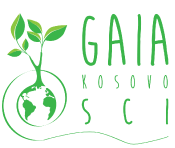The survey was conducted during March 2019 as one of the initial activities with Climate 4 change project. The report analyzed data based on 251 survey respondents from Kosovo. The survey aimed to gain further insight with regards to Kosovo’s youth level of awareness concerning the state of the environment, and especially climate change.
With regards to youth perception on seriousness of the situation concerning environmental problems in Kosovo, around 48% consider it as alarmingly serious, followed by another 30% who consider the situation to be very serious. On the other hand, to the question listing some of the most important environmental problems, 66% of respondents selected air pollution and 52% waste management. Provided the obvious issues with air quality in Kosovo for the past few years, it is understandable that it dominates among concerns of youth.
Surprisingly, climate change was seen as an important environmental issue only by 3.2% of respondents.
Furthermore, an absolute majority of respondents, or 86% of the sample, agree that something can be done to alleviate environmental problems in Kosovo, and everyone, including the government, corporations and private companies, NGO-s, and random citizens carry this responsibility equally.
When asked how involved is Kosovo youth into promoting environmental protection, the responses seemed to be divided in two corners; on one hand, 29% claimed to be involved in actions that aim to preserve the environment on a regular basis, and on the other hand, 25% claimed to be involved in similar actions only through social media.
Using public transport or walking seemed to be two of the most popular means of taking care of the environment, while avoiding meat and dairy products were not preferred. Engaging in future activities that aim to protect the environment including educational activities and long-term campaigns, among others, also received a positive feedback.
The full report can be downloaded from C4C_report (1).
This grant is supported by the ‘Civil Society programme for Albania and Kosovo’, financed by the Norwegian Ministry of Foreign Affairs and managed by Kosovar Civil Society Foundation (KCSF) in partnership with Partners Albania for Change and Development (PA). The content and recommendations do not represent the official position of the Norwegian Ministry of Foreign Affairs and Kosovar Civil Society Foundation (KCSF).





